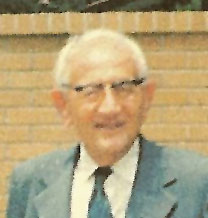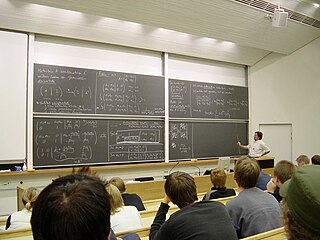Related Research Articles

George Pólya was a Hungarian mathematician. He was a professor of mathematics from 1914 to 1940 at ETH Zürich and from 1940 to 1953 at Stanford University. He made fundamental contributions to combinatorics, number theory, numerical analysis and probability theory. He is also noted for his work in heuristics and mathematics education. He has been described as one of The Martians.

In contemporary education, mathematics education is the practice of teaching and learning mathematics, along with the associated scholarly research.

New Mathematics or New Math was a dramatic but temporary change in the way mathematics was taught in American grade schools, and to a lesser extent in European countries and elsewhere, during the 1950s–1970s. Curriculum topics and teaching practices were changed in the U.S. shortly after the Sputnik crisis. The goal was to boost students' science education and mathematical skill to meet the technological threat of Soviet engineers, reputedly highly skilled mathematicians.
Morris Kline was a professor of Mathematics, a writer on the history, philosophy, and teaching of mathematics, and also a popularizer of mathematical subjects.

Serge Lang was a French-American mathematician and activist who taught at Yale University for most of his career. He is known for his work in number theory and for his mathematics textbooks, including the influential Algebra. He received the Frank Nelson Cole Prize in 1960 and was a member of the Bourbaki group.
Founded in 1920, The National Council of Teachers of Mathematics (NCTM) is the world's largest mathematics education organization.
Claudia Zaslavsky was an American mathematics teacher and ethnomathematician.

Discovery learning is a technique of inquiry-based learning and is considered a constructivist based approach to education. It is also referred to as problem-based learning, experiential learning and 21st century learning. It is supported by the work of learning theorists and psychologists Jean Piaget, Jerome Bruner, and Seymour Papert.
Mathematical anxiety, also known as math phobia, is anxiety about one's ability to do mathematics.
Reform mathematics is an approach to mathematics education, particularly in North America. It is based on principles explained in 1989 by the National Council of Teachers of Mathematics (NCTM). The NCTM document, Curriculum and Evaluation Standards for School Mathematics, attempted to set forth a vision for K-12 mathematics education in the United States and Canada. Their recommendations were adopted by many education agencies, from local to federal levels through the 1990s. In 2000, NCTM revised its standards with the publication of Principles and Standards for School Mathematics (PSSM). Like the first publication, these updated standards have continued to serve as the basis for many states' mathematics standards, and for many federally funded textbook projects. The first standards gave a strong call for a de-emphasis on manual arithmetic in favor of students' discovering their own knowledge and conceptual thinking. The PSSM has taken a more balanced view, but still emphasizes conceptual thinking and problem solving.
Donald J. Newman was an American mathematician and professor, excelling at the Putnam mathematics competition while an undergraduate at City College of New York and New York University, and later receiving his PhD from Harvard University in 1953.
Richard James Duffin was an American physicist, known for his contributions to electrical transmission theory and to the development of geometric programming and other areas within operations research.

Mathematical beauty is the aesthetic pleasure typically derived from the abstractness, purity, simplicity, depth or orderliness of mathematics. Mathematicians often express this pleasure by describing mathematics as beautiful. They might also describe mathematics as an art form or, at a minimum, as a creative activity. Comparisons are often made with music and poetry.
Statistics education is the practice of teaching and learning of statistics, along with the associated scholarly research.

Mathematics: The Loss of Certainty is a book by Morris Kline on the developing perspectives within mathematical cultures throughout the centuries.
The Secondary School Mathematics Curriculum Improvement Study (SSMCIS) was the name of an American mathematics education program that stood for both the name of a curriculum and the name of the project that was responsible for developing curriculum materials. It is considered part of the second round of initiatives in the "New Math" movement of the 1960s. The program was led by Howard F. Fehr, a professor at Columbia University Teachers College.
Howard Levi was an American mathematician who worked mainly in algebra and mathematical education. Levi was very active during the educational reforms in the United States, having proposed several new courses to replace the traditional ones.
Robert B. Davis was an American mathematician and mathematics educator.
Margaret E. Baron was a British mathematics educator and historian of mathematics known for her book on the history of calculus.
References
- ↑ Jürgen Maass; Wolfgang Schlöglmann (2006). New Mathematics Education Research and Practice. Sense Publishers. p. 1. ISBN 978-90-77874-74-5.
- ↑ Joseph W. Dauben; Christoph J. Scriba (23 September 2002). Writing the History of Mathematics: Its Historical Development. Springer Science & Business Media. p. 458. ISBN 978-3-7643-6167-9.
- ↑ Fey, James T.. 1978. “U.S.A.”. Educational Studies in Mathematics 9 (3). Springer: 339–353. https://www.jstor.org/stable/3481942.